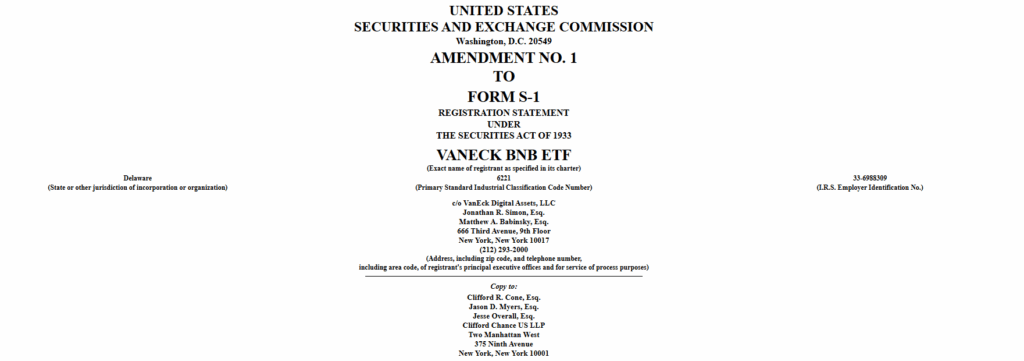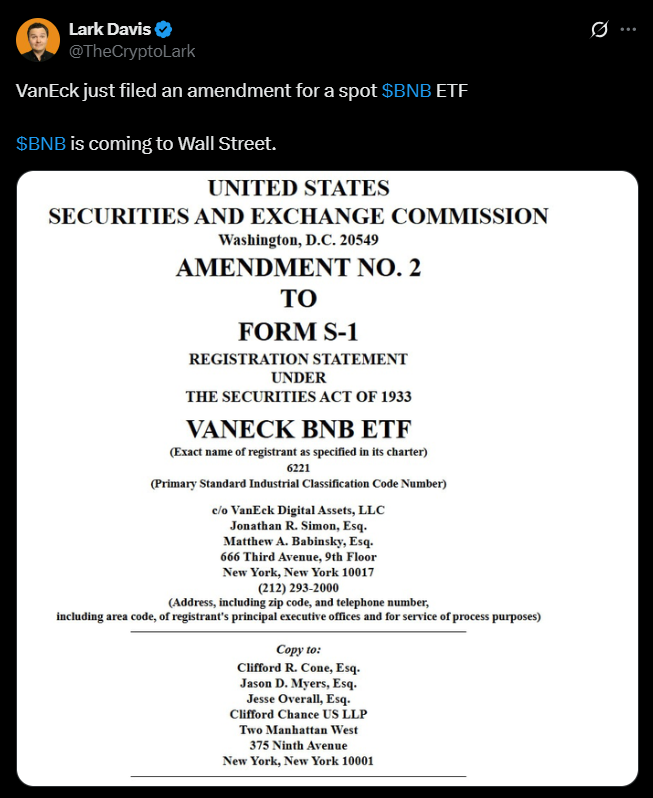- VanEck removed staking from its proposed BNB ETF, saying it will not earn any rewards at launch and may never introduce staking in the future.
- The updated filing hints at major regulatory concerns, warning that BNB could be ruled a security and the trust may need to dissolve if that happens.
- Unlike its Solana ETF, VanEck is taking a defensive approach with BNB, leaving investors with price-only exposure and no staking yield boost.
VanEck has officially pulled staking out of its proposed spot BNB ETF, a sharp shift just weeks after the same firm rolled out staking in its new Solana product. In an updated S-1 filing submitted to the U.S. Securities and Exchange Commission, the asset manager made it clear that the BNB Trust will not use any of its tokens for staking at launch. It also warned there is no guarantee staking will ever be added later on, even if market conditions improve or demand rises.

The decision lands at an awkward moment for BNB, a token that keeps drifting in and out of the SEC’s line of fire. While Solana staking has already found its way into U.S. ETF wrappers, BNB’s legal risk appears serious enough that VanEck is choosing caution over potential yield. For investors, that means the ETF will track price only, with no extra staking income on top.
No Staking, No Yield Boost
In the revised filing, VanEck states that the BNB ETF “will not employ its BNB in Staking Activities” at the time of listing. The document goes further, stressing that there can be no assurance the trust will ever stake assets in the future, even through third-party staking providers. That is a big step back from earlier language in May, when VanEck said the fund might stake a portion of its holdings “from time to time.”
The firm openly admits this could drag on performance compared to simply holding BNB directly. Spot holders can opt into staking and earn an additional yield, while ETF buyers will be locked into price-only exposure. In a market where staking ETFs are starting to become a competitive selling point, this looks like a deliberate, defensive move rather than just a design choice.
Regulatory Anxiety Is Written Between The Lines
VanEck never says “we’re scared of the SEC” in the filing, but the subtext is pretty obvious. The prospectus warns that the SEC or a federal court could decide that BNB is a security. If that happens, the fund might have to dissolve, either because regulators force the issue or because VanEck decides the risk is too high.
The language even concedes that BNB may already qualify as a security under current facts, which is unusually candid for an issuer. The trust will keep operating only as long as the sponsor believes, in good faith, that BNB is not a security. If that belief changes, or a formal ruling comes down, the exit door is basically built into the structure. It’s a quiet way of saying: this entire product sits on shifting legal ground.

BNB’s SEC History Keeps Haunting It
BNB’s path with regulators has been messy for years. Back in 2023, when the SEC sued Binance, Coinbase, and Kraken, the regulator listed dozens of tokens it viewed as unregistered securities, and BNB made that list. A judge later ruled that secondary sales of BNB on exchanges did not automatically count as securities transactions, but that did not magically clean up the token’s status.
On top of that, staking has turned into its own legal headache. Earlier guidance from SEC staff suggested protocol-level staking did not have to be registered as a securities transaction. But that statement was not unanimous inside the commission, and the debate over whether staking returns look like “investment contracts” has never really been settled. For a firm like VanEck, mixing BNB, staking, and U.S. regulation into one product is a lot of risk to swallow at once.
A Strategic Retreat, Not Just Caution
Taken together, the picture is pretty clear. VanEck is willing to experiment with staking on Solana, where the regulatory posture feels looser, but it is backing away from anything that might complicate a BNB ETF. The mechanics of staking aren’t the problem by themselves. The issue is who the SEC has already gone after, what’s been said in past enforcement actions, and how fragile BNB’s legal status still looks.
For investors, the message is simple but important. The VanEck BNB ETF, at least in its current form, is a pure price-tracking vehicle with an explicit disclaimer that regulatory risk could force major structural changes, including a full unwind. There’s no staking uplift to cushion that risk and no firm promise that staking will ever be added.












